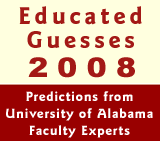 Come November, you’ll likely be deciding between U.S. Sen. Hillary Rodham Clinton and former Massachusetts Gov. Mitt Romney, according to the predictions of a University of Alabama political scientist.
Come November, you’ll likely be deciding between U.S. Sen. Hillary Rodham Clinton and former Massachusetts Gov. Mitt Romney, according to the predictions of a University of Alabama political scientist.
Both candidates have the kind of experience that could help them prevail by convention time: Clinton – the Democrat – with her experience in the Senate and her husband’s White House, and Romney – the Republican – with his accomplishments in business and in health-care reform.
“They will both have their bad moments, but neither will make huge blunders because of inexperience,” says David Lanoue, chair of the political science department in UA’s College of Arts and Sciences. “It is critical for Romney to win in Iowa and New Hampshire, however. If he doesn’t, John McCain or even Mike Huckabee could slip into contention.”
Also on the horizon: Lanoue sees Clinton picking somebody besides U.S. Sen. Barack Obama for the vice president slot. He predicts Clinton would reach out to a more experienced candidate like former Iowa Gov. Tom Vilsack.
One obstacle Romney still faces in the Republican nomination process is his membership in the Church of Jesus Christ of Latter-day Saints, which may put off evangelical voters, Lanoue says. On the other hand, Romney could prevail with those voters over former New York Mayor Rudolph Giuliani, because of Giuliani’s liberal social views and political scandals that date back to his mayorship.
“I don’t think the Christian right will ever fully embrace Rudy Giuliani with his views on abortion, and Giuliani’s scandals may reach critical mass,” Lanoue says.
The top issues in the 2008 presidential campaign will include health care, immigration and national security, Lanoue says. The war in Iraq may be less prominent if the situation on the ground stabilizes, which could help a Republican candidate.
“As long as the violence stays at current levels or declines a little bit and Bush is able to withdraw some troops, Iraq won’t be as big an issue,” Lanoue says. “That will rebound to the benefit of Republicans. The people who think this is going to be a big Democratic year are possibly going to be mistaken. As anger over the Iraq war declines, we’re probably going down to another nail-biter.”
With about 40 states already in the Democratic or Republican column, Lanoue sees the election coming down to about 10 swing states, including small states in the Intermountain West, where a growing Hispanic vote could be key.
“Where are the new swing states?” he says. “Nevada, New Mexico, Colorado and Arizona – Arizona maybe not so much, but it’s certainly not Goldwater’s Arizona anymore. It’s among the states that may be in play this time around.”
Source
Dr. David Lanoue, 205/348-5981, dlanoue@tenhoor.as.ua.edu